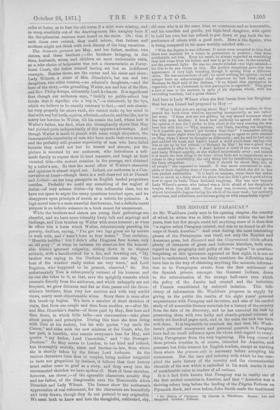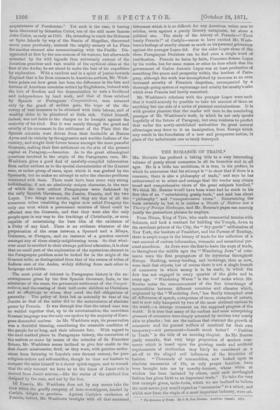THE HISTORY OF PARAGUAY.*
As Mr. Washburn justly says in his opening chapter, the country of which he writes was so little known until within the last few years, that but few people could tell anything more of it than that " a region called Paraguay existed, and was to be found in all the maps of South America." And oven during the most interesting phases of the Paraguayan war itself, not only the English anal American press, but Hansard and the Congressional Globe afford. plenty of instances of gross and ludicrous blunders, both with regard to the geography and polity of the " region" in question. Surprising as this ignorance appeared at first sight, it is not so hard to understand, when one fairly considers the difficulties that have lain in the way of obtaining anything like accurate informa- tion as to Paraguayan events, from the first settlement of the Spanish princes amongst the Guarani Indians, down to the extermination of the strange half-caste race which the policy of the Jesuits had created and the terrorism. of Francis consolidated by enforced isolation. This defi- ciency of information Mr. Washburn proposes to supply by giving to the public the results of his eight years' pereonal acquaintance with Paraguay and its rulers, and also of his careful study of all accessible literary materials for a history of the country from the date of its discovery, and he has executed his task by presenting them with two bulky and closely-printed volumes of nearly six hundred pages each, and in the main the task has been well done. It is impossible to overlook the fact that Mr. Wash.. burn's personal annoyances and personal quarrels in Paraguay have had no small influence upon his views with regard to every- thing Paraguayan from the very beginning. His long resume of these private troubles is, of course, intended for America, and possesses but little interest for Euglish readers, except as warning them where the granum sails is necessary before accepting his statements. But the care and industry with which he has corn:- piled the early history of the country and the circumstantial chronicle of the war which is embodied in his work render it one of considerable value to readers of all nations.
It is a fact little known that Paraguay was in reality one of the first settled countries in America, and that " Asuncion was ft thriving colony long before the landing of the Pilgrim Fathers on Plymouth Rock, and even before John Smith made the traditional * The Ifiatory of Paraguay. By Charles A. Washburn. Boston: Leo au& Sheppard. London; TrUbnor. acquaintance of Pocohontas." Yet such is the case, it having been discovered by Sebastian Cabot, son of the still more famous John Cabot, as early as 1526. Ile, intending to reach the Moluccas or Spice Islands by way of the Straits of Magellan, discovered seven years previously, mistook the mighty estuary of La Plata for another channel also communicating with the Pacific. Dis- appointed at first by the non-success of his venture, but afterwards attracted by the wild legends then universally current of the luxurious grandeur and vast wealth of the mythical cities at the foot of the Andes, ho set about to make the best of his expedition y exploration. With a candour and in a spirit of justice towards England that is far from common in American authors, Mr. Wash- burn points out how great has been the difference in the fate and fortune of American countries settled by Englishmen, imbued with the love of freedom and the determination to earn a livelihood and independence by hard work, and that of those subdued by Spanish or Portuguese Conquistadores, men actuated only by the greed of sudden gain, the hope of the dis- covery of vast treasures to be obtained with little labour, and of wealthy cities to be plundered at little risk. Cabot himself, indeed, was not liable to the charges to be brought against the majority of his kind. But it was mainly through the greed and .cruelty of his successors in the settlement of the Plate that the .Spanish colonists were driven from their footholds at Buenos Ayres and its vicinity by the aggressive and warlike Indians of the country, and sought their future homes amongst the more peaceful Guaranis, making their first settlement on the site of the present capital at Paraguay,—Asuncion. As to the great ethnological questions involved in the origin of the Paraguayan race, Mr. Washburn gives a good deal of carefully-compiled information from earlier authors as to the special characteristics of the Guarani race, or rather group of races, upon which it was grafted by the Spaniards, bat he makes no attempt to solve the obscure problems connected with them. There must have been some very- strong individuality, if not an absolutely unique character, in the race of which the now extinct Paraguayans were fashioned by the early Spanish Governors, the Jesuits, Francis, and the two Lopez. Two things are certain, and they are that of all the ritunerous tribes inhabiting the region now called Paraguay the -only one with which a permanent mixture of blood could be -effected was the Guaranis, and that they were also the only people open in any way to the teachings of Christianity, or even capable of entertaining the bare idea of the existence of a Deity of any kind. There is no evidence whatever of the perpetuation of the cross between a Spanard and a Maya, Guiacuru, or Paragua, and no instance of a genuine convert amongst any of these closely-neighbouring races. So that what- ever must be ascribed to their strange political education, it is clear that no small part of the explanation of the mysterious element in the Paraguayan problem must be looked for in the origin of the Guarani tribe, as distinguished from that of the swarm of tribes of Indians east of the Andes, widely differing from each other in language and habits.
The next point of interest in Paraguayan history is the en- couragement given by the first Spanish Governor, Irala, to the admixture of the races, the permanent settlement of the Conguis 4adores, and the rearing of their half-caste children as Christians and as offsprings to whom they owed the full obligations of paternity. The policy of halts led as naturally to that of the Jesuits as that of the latter did to the maintenance of absolute power by Francis. It was through him that the mixed race was eo welded together that, up to its extermination, the unwritten Guarani language was the only one spoken by the majority of Euro- pean-descended natives. As Mr. Washburn says, its preservation was a doubtful blessing, considering the miserable condition of the people for so long, and their ultimate fate. With regard to 'the next marked phase in Paraguayan history, the conversion of the natives en mama by means of the miracles of St. Francisco 'Solent), Mr. Washburn seems inclined to give fair credit to the first Jesuit missionaries, fired, as they were, with genuine enthu- siasm from listening to Loyola's own fervent oratory, for pure religious ardour and self-sacrifice, though be does not hesitate to -compare the saint himself to a clever spirit-rapper, and to remark that the only account we have as to the times of Jesuit rule is derived from Jesuit sources,—like the statue of the subdued lion designed by the man, and not by the lion.
Of Francis, Mr. Washburn does not by any means take the view which the goodly company of hero-worshippers, headed by Carlyle, delight to proclaim. Against Carlyle's exaltation of Francia, indeed, Mr, Washburn inveighs with all that sustained
bitterness which it is so difficult for any American writer ever to subdue, even against a purely literary antagonist, let alone a political one. The study of the history of Francis—." Thou lonely Francis, I" of Carlyle—seems to have excited Mr. Wash- burn's feelings of enmity almost as much as his personal grievances against the younger Lopez did. For the older Lopez alone of the three Paraguayan Dictators can he find even a single word of justification. Francis he hates by faith, Francisco Solano Lopez by his works, but for some reason or other he does admit that the government of Carlos Antonio Lopez was at least productive of something like peace and prosperity within the borders of Para- guay, although the work was accomplished by recourse to an even increased severity of Francis's despotism, accompanied by a thorough-going system of espionnago and cruelty for cruelty's sake which even Francis had barely conceived.
Mr. Washburn's relations with the younger Lopez were such that it would scarcely be possible to take his account of them as anything but one side of a series of personal recriminations. It is with greater pleasure that the reader will turn to the concluding passages of Mr. Washburn's work, in which he not only speaks hopefully of the future of Paraguay, but even ventures to predict that under the newly-established authorities its great natural advantages may draw to it an immigration, from Europe which may result in the foundation of a new and prosperous nation, in place of the unfortunate one so lately destroyed.



































 Previous page
Previous page